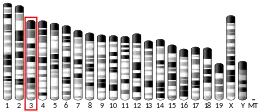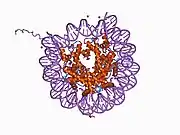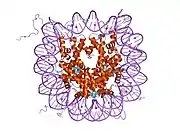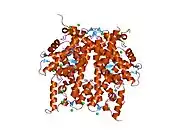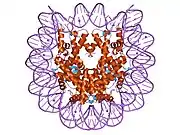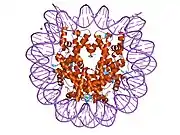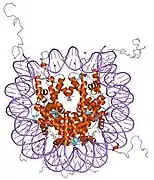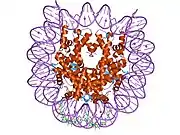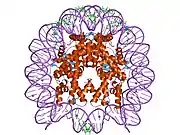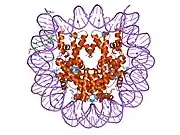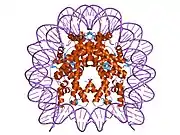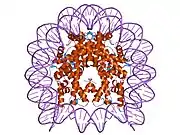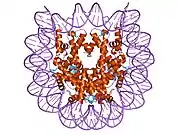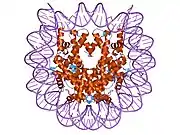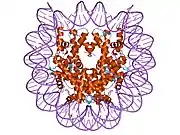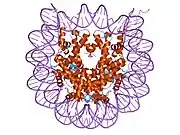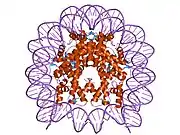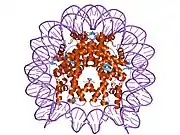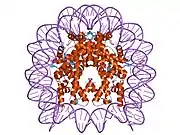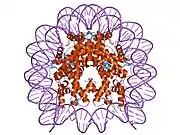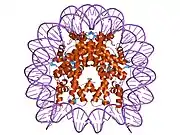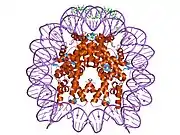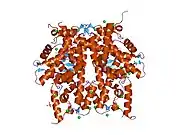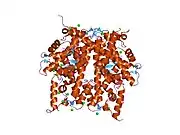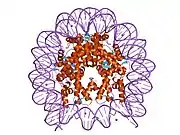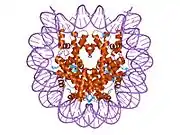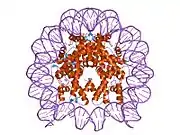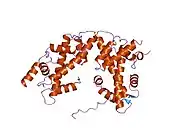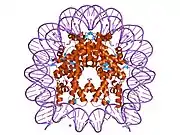| H2AC18 | |||||||||||||||||||||||||||||||||||||||||||||||||||
|---|---|---|---|---|---|---|---|---|---|---|---|---|---|---|---|---|---|---|---|---|---|---|---|---|---|---|---|---|---|---|---|---|---|---|---|---|---|---|---|---|---|---|---|---|---|---|---|---|---|---|---|
 | |||||||||||||||||||||||||||||||||||||||||||||||||||
| Identifiers | |||||||||||||||||||||||||||||||||||||||||||||||||||
| Aliases | H2AC18, H2A, H2A.2, H2A/O, H2A/q, H2AFO, H2a-615, HIST2H2AA, histone cluster 2, H2aa3, histone cluster 2 H2A family member a3, HIST2H2AA3, H2A clustered histone 18, H2AC19 | ||||||||||||||||||||||||||||||||||||||||||||||||||
| External IDs | OMIM: 142720 MGI: 2448283 HomoloGene: 116071 GeneCards: H2AC18 | ||||||||||||||||||||||||||||||||||||||||||||||||||
| |||||||||||||||||||||||||||||||||||||||||||||||||||
| |||||||||||||||||||||||||||||||||||||||||||||||||||
| |||||||||||||||||||||||||||||||||||||||||||||||||||
| |||||||||||||||||||||||||||||||||||||||||||||||||||
| |||||||||||||||||||||||||||||||||||||||||||||||||||
| Wikidata | |||||||||||||||||||||||||||||||||||||||||||||||||||
| |||||||||||||||||||||||||||||||||||||||||||||||||||
Histone H2A type 2-A is a protein that in humans is encoded by the HIST2H2AA3 gene.[5][6][7][8]
Function
Histones are basic nuclear proteins that are responsible for the nucleosome structure of the chromosomal fiber in eukaryotes. Two molecules of each of the four core histones (H2A, H2B, H3, and H4) form an octamer, around which approximately 146 bp of DNA is wrapped in repeating units, called nucleosomes. The linker histone, H1, interacts with linker DNA between nucleosomes and functions in the compaction of chromatin into higher order structures. This gene is intronless and encodes a member of the histone H2A family. Transcripts from this gene lack polyA tails but instead contain a palindromic termination element. This gene is found in a histone cluster on chromosome 1. This gene is one of four histone genes in the cluster that are duplicated; this record represents the centromeric copy.[8]
References
- 1 2 3 GRCh38: Ensembl release 89: ENSG00000288825 - Ensembl, May 2017
- 1 2 3 GRCm38: Ensembl release 89: ENSMUSG00000063954 - Ensembl, May 2017
- ↑ "Human PubMed Reference:". National Center for Biotechnology Information, U.S. National Library of Medicine.
- ↑ "Mouse PubMed Reference:". National Center for Biotechnology Information, U.S. National Library of Medicine.
- ↑ Marashi F, Prokopp K, Stein J, Stein G (April 1984). "Evidence for a human histone gene cluster containing H2B and H2A pseudogenes". Proceedings of the National Academy of Sciences of the United States of America. 81 (7): 1936–40. Bibcode:1984PNAS...81.1936M. doi:10.1073/pnas.81.7.1936. PMC 345411. PMID 6326092.
- ↑ Mannironi C, Orr A, Hatch C, Pilch D, Ivanova V, Bonner W (February 1994). "The relative expression of human histone H2A genes is similar in different types of proliferating cells". DNA and Cell Biology. 13 (2): 161–70. doi:10.1089/dna.1994.13.161. PMID 8179821.
- ↑ Braastad CD, Hovhannisyan H, van Wijnen AJ, Stein JL, Stein GS (November 2004). "Functional characterization of a human histone gene cluster duplication". Gene. 342 (1): 35–40. doi:10.1016/j.gene.2004.07.036. PMID 15527963.
- 1 2 "Entrez Gene: HIST2H2AA3 histone cluster 2, H2aa3".
Further reading
- Allen BS, Stein JL, Stein GS, Ostrer H (June 1991). "Single-copy flanking sequences in human histone gene clusters map to chromosomes 1 and 6". Genomics. 10 (2): 486–8. doi:10.1016/0888-7543(91)90337-E. PMID 2071153.
- Kaiser P, Mandl S, Schweiger M, Schneider R (December 1995). "Characterization of functionally independent domains in the human ubiquitin conjugating enzyme UbcH2". FEBS Letters. 377 (2): 193–6. doi:10.1016/0014-5793(95)01323-7. PMID 8543049.
- Wang ZF, Tisovec R, Debry RW, Frey MR, Matera AG, Marzluff WF (August 1996). "Characterization of the 55-kb mouse histone gene cluster on chromosome 3". Genome Research. 6 (8): 702–14. doi:10.1101/gr.6.8.702. PMID 8858345.
- Albig W, Doenecke D (December 1997). "The human histone gene cluster at the D6S105 locus". Human Genetics. 101 (3): 284–94. doi:10.1007/s004390050630. PMID 9439656. S2CID 38539096.
- El Kharroubi A, Piras G, Zensen R, Martin MA (May 1998). "Transcriptional activation of the integrated chromatin-associated human immunodeficiency virus type 1 promoter". Molecular and Cellular Biology. 18 (5): 2535–44. doi:10.1128/mcb.18.5.2535. PMC 110633. PMID 9566873.
- Deng L, de la Fuente C, Fu P, Wang L, Donnelly R, Wade JD, Lambert P, Li H, Lee CG, Kashanchi F (November 2000). "Acetylation of HIV-1 Tat by CBP/P300 increases transcription of integrated HIV-1 genome and enhances binding to core histones". Virology. 277 (2): 278–95. doi:10.1006/viro.2000.0593. PMID 11080476.
- Nemergut ME, Mizzen CA, Stukenberg T, Allis CD, Macara IG (May 2001). "Chromatin docking and exchange activity enhancement of RCC1 by histones H2A and H2B". Science. 292 (5521): 1540–3. Bibcode:2001Sci...292.1540N. doi:10.1126/science.292.5521.1540. PMID 11375490.
- Deng L, Wang D, de la Fuente C, Wang L, Li H, Lee CG, Donnelly R, Wade JD, Lambert P, Kashanchi F (October 2001). "Enhancement of the p300 HAT activity by HIV-1 Tat on chromatin DNA". Virology. 289 (2): 312–26. doi:10.1006/viro.2001.1129. PMID 11689053.
- Marzluff WF, Gongidi P, Woods KR, Jin J, Maltais LJ (November 2002). "The human and mouse replication-dependent histone genes". Genomics. 80 (5): 487–98. doi:10.1016/S0888-7543(02)96850-3. PMID 12408966.
- Lusic M, Marcello A, Cereseto A, Giacca M (December 2003). "Regulation of HIV-1 gene expression by histone acetylation and factor recruitment at the LTR promoter". The EMBO Journal. 22 (24): 6550–61. doi:10.1093/emboj/cdg631. PMC 291826. PMID 14657027.
- Yusufzai TM, Tagami H, Nakatani Y, Felsenfeld G (January 2004). "CTCF tethers an insulator to subnuclear sites, suggesting shared insulator mechanisms across species". Molecular Cell. 13 (2): 291–8. doi:10.1016/S1097-2765(04)00029-2. PMID 14759373.
- Zhang Y, Griffin K, Mondal N, Parvin JD (May 2004). "Phosphorylation of histone H2A inhibits transcription on chromatin templates". The Journal of Biological Chemistry. 279 (21): 21866–72. doi:10.1074/jbc.M400099200. PMID 15010469.
- Aihara H, Nakagawa T, Yasui K, Ohta T, Hirose S, Dhomae N, Takio K, Kaneko M, Takeshima Y, Muramatsu M, Ito T (April 2004). "Nucleosomal histone kinase-1 phosphorylates H2A Thr 119 during mitosis in the early Drosophila embryo". Genes & Development. 18 (8): 877–88. doi:10.1101/gad.1184604. PMC 395847. PMID 15078818.
- Wang H, Wang L, Erdjument-Bromage H, Vidal M, Tempst P, Jones RS, Zhang Y (October 2004). "Role of histone H2A ubiquitination in Polycomb silencing". Nature. 431 (7010): 873–8. Bibcode:2004Natur.431..873W. doi:10.1038/nature02985. PMID 15386022. S2CID 4344378.


